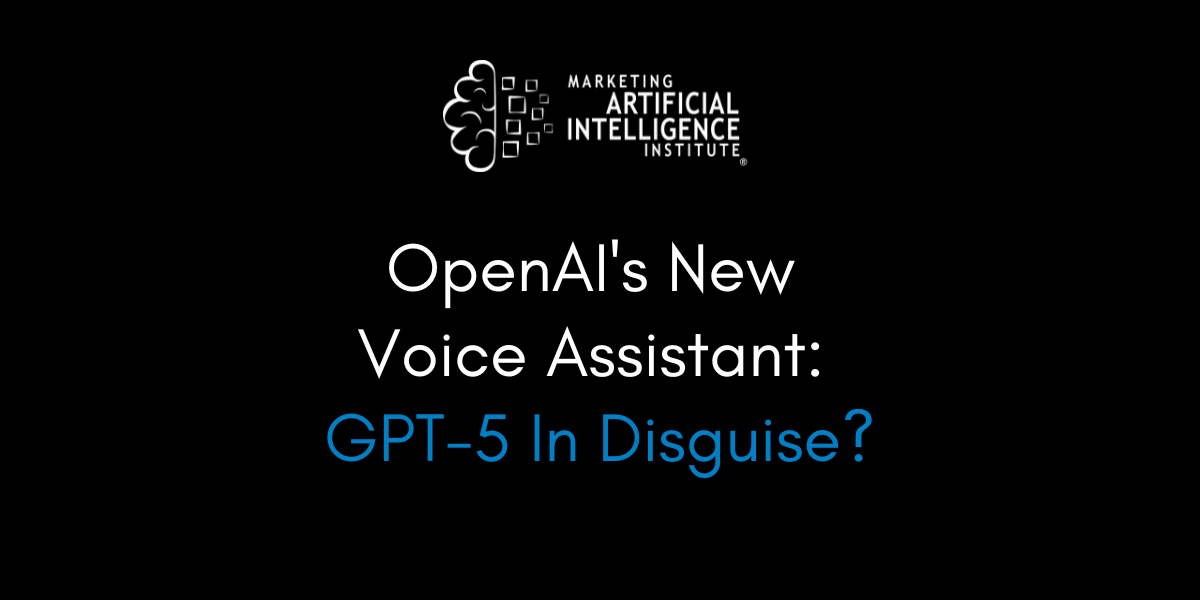OpenAI is rolling out its much-anticipated updated voice assistant for ChatGPT, and early demos are downright impressive.
The release comes after a delay from the initially planned June launch, as OpenAI took time to address safety concerns and make improvements.
And it seems the wait was worth it…
The new voice assistant is much faster, realistic, and capable than the voice capabilities currently baked into ChatGPT.
In fact, it’s so good that it has some big implications for marketers and business leaders.
I got the scoop on why this new feature is so important from Marketing AI Institute founder and CEO Paul Roetzer on Episode 108 of The Artificial Intelligence Show.
It’s good (really, really good)
The initial demo of this new voice assistant was impressive when OpenAI previewed it in May, says Roetzer. Now, the demos coming out of the real thing in action are worth paying attention to, he says.
“I have seen people posting videos that I would say are somewhat shocking in how good this thing is,” says Roetzer.
"It's able to change its tone, inflection, accent, integrate sound effects into its voice, convey emotion, and continue when it's interrupted. It's somewhat uncanny, like how human-like it is."
Is this GPT-5 in disguise?
In fact, it’s so good that Roetzer wonders if there’s more going on here than just a new feature for GPT-4o.
“The more I see these examples, the harder time I have believing that the current model [GPT-4o] that we’re all using in ChatGPT is actually what’s powering this thing,” he says. “It just seems like it has way more capability than anything we’ve interacted with before.”
In the last six months, he notes, OpenAI has previewed various advanced capabilities in addition to voice—or has been rumored to be working on them. These include:
- Video generation with Sora
- Improved image generation
- Improved vision capabilities
- Enhanced reasoning and problem-solving (the leaked “Project Strawberry”)
- Search capabilities
"The more I think about this, the more I think we're already seeing [parts of GPT-5]," Roetzer suggests.
Roetzer speculates that these individual pieces, when combined, could form the foundation of the next model.
The race for AI supremacy
This development puts OpenAI in a league of its own, alongside Google, in the pursuit of more advanced AI.
Roetzer notes that other players like Anthropic, despite their strengths, don't seem to be operating at the same level when it comes to multimodal capabilities like voice.
"Google and OpenAI are in a realm all their own right now," Roetzer observes.
The advanced capabilities of OpenAI's voice assistant also raise questions about the future of existing voice assistants like Apple's Siri.
Roetzer wonders, "If you fast forward a month or two from now and all of us can have access to this OpenAI voice capability, why would I ever open Siri again?"
However, he speculates that Apple might differentiate itself by positioning Siri as an on-device AI agent that prioritizes privacy and deep integration with Apple's ecosystem.
This could create a distinction between OpenAI's more advanced, general-purpose voice assistant and Apple's Siri as a trusted, privacy-focused assistant deeply integrated with your device and apps.
The future of human-AI interaction
As these voice technologies become widely available, we're likely entering a new era of human-computer interaction.
"Voice truly becomes an interface and that's going to be wild," Roetzer predicts.
This shift could have profound implications for how we interact with technology in our daily lives and in business settings. It may also raise new ethical considerations as these AI assistants become more human-like in their interactions.
"I get the same feeling in my stomach I do when someone [interrupts] another human," Roetzer admits, describing his reaction to seeing people interact rudely with AI voice assistants.
"It's going to be a problem. It's very bizarre how you start to assign human-like qualities to these things, even though we know they're not there."
Mike Kaput
As Chief Content Officer, Mike Kaput uses content marketing, marketing strategy, and marketing technology to grow and scale traffic, leads, and revenue for Marketing AI Institute. Mike is the co-author of Marketing Artificial Intelligence: AI, Marketing and the Future of Business (Matt Holt Books, 2022). See Mike's full bio.



